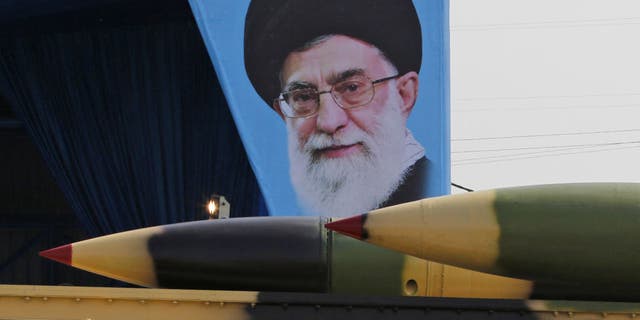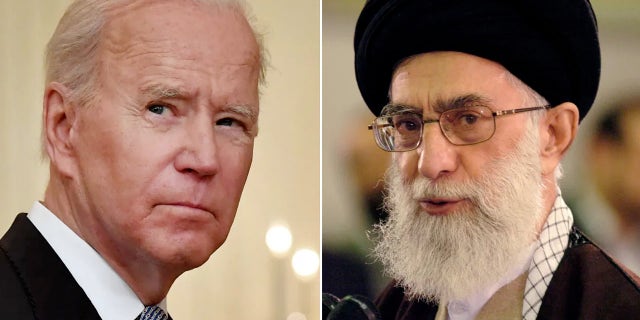JERUSALEM — The Biden administration is facing intense criticism for its reported willingness to pump $17 billion dollars into the coffers of the world’s worst state-sponsor of terrorism — the Islamic Republic of Iran — to reach a controversial deal to impose temporary restrictions on Iran’s illicit nuclear program and secure the release of American hostages.
“When Joe Biden was elected, Iran’s nuclear program was in a box, and their economy was in a downward spiral,” Sen. Ted Cruz, R-Texas, told Fox News Digital. “Biden looked the other way as the Ayatollah steadily advanced to nuclear weapons, and the regime resumed exports of millions of barrels of oil a day.
“All the while, Iran became Putin’s No. 1 military backer. Biden has already been funding both sides of the war in Ukraine, and so it would be appalling but unsurprising if he started openly sending billions more to the Ayatollah.”
Cruz’s criticism of Biden’s Iran policy follows a report in Iran International, a Washington D.C.-based independent news organization, that a deal might be imminent between the U.S. and Tehran over sanctions.
Iraq is only permitted to transfer funds to Iran in Iraqi dinars. As a result of tough sanctions on Iran, Tehran can only use the dinars to buy merchandise from Iraq. Tehran views this system as a trade balance and maintains there is an outstanding Iraqi debt.
Iran’s ambassador to Iraq, Mohammad Kazem Al-Sadegh, told an Iraqi news outlet this year that Iraq owes Iran $11 billion for imports of gas and electricity.

An Iranian military truck carries surface-to-air missiles past a portrait of Iran Supreme Leader Ayatollah Ali Khamenei during a parade on the occasion of the country’s annual army day April 18, 2018, in Tehran. (Atta Kenare/AFP via Getty Images)
South Korea purchased $7 billion in Iranian oil prior to the imposition of comprehensive energy sanctions on Iran in 2019. The money is being held by South Korea.
“The United States should never spend one penny in ransom on payments to the world’s leading state sponsors of terrorism,” noted former State Department spokesperson Morgan Ortagus, who served during the Trump administration.
“Secretary Pompeo and President Trump brought two Americans home from Iranian prison without paying a cent. Giving Iran billions of dollars would only incentivize more hostage taking and lead more Americans and their families to suffer. And fuel more Iranian terrorism around the world.”

Morgan Ortagus, spokesperson for the United States Department of State, answers questions during a press conference in Washington Sept. 12, 2019. (Yasin Ozturk/Anadolu Agency via Getty Images)
President Trump withdrew from the Iran nuclear deal, formally known as the Joint Comprehensive Plan of Action, in 2018 because his administration argued it did not stop Tehran from building nuclear weapons and continued to permit Iran to fund terrorism and develop long-range missiles.
Middle East news outlets are also reporting on accelerated talks between the U.S. and Iran. The Israeli media outlet Haaretz on Wednesday reported that defense officials for the Jewish state believe a deal is moving at a fast pace, and an agreement could be reached within weeks. The newspaper wrote “some $20 billion in Iranian assets from frozen bank accounts” could be transferred to Iran’s regime.

President Biden and Ayatollah Ali Khamenei, Iran’s supreme leader (Biden Photo by Nicholas Kamm/AFP via Getty Images; Khamenei photo by Probst/ullstein bild via Getty Images)
The elements of the proposed deal would compel Iran to stop enriching uranium at high levels in exchange for significant sanctions relief. Iran’s regime was caught in early 2023 enriching near weapons-grade uranium purity for an atomic bomb.
There are also three U.S. nationals being held hostage in Iran — Siamak Namazi, Emad Shargi and Morad Tahbaz. A fourth hostage is Jamshid Sharmahd, a German citizen and long-term legal resident of California who was abducted by Iran’s regime in Dubai in 2020.
“If the Americans have the will, it could be signed quickly. But, again, Iran is not going to sit and wait. The world is changing, and Iran is using those opportunities to the utmost.”
Iran has turned a large sector of its economy into a war economy. The regime announced Tuesday it created the first domestically-made hypersonic ballistic missile.

Mahsa Amini was killed by Iran’s morality police, leading to massive anti-regime protests across the country. (Obtained by Fox News)
“It can bypass the most advanced anti-ballistic missile systems of the United States and the Zionist regime, including Israel’s Iron Dome,” Iranian state TV declared.
The demonstrations have tapered off, but the population is restive. And the regime desperately needs an infusion of cash to aid its vast security apparatus to counter new waves of protests, Iran analysts note.
Fox News Digital sent press queries to the Islamic Republic of Iran’s UN Mission in New York City and to its Foreign Ministry in Tehran.

